The Intel Skylake-X Review: Core i9 7900X, i7 7820X and i7 7800X Tested
by Ian Cutress on June 19, 2017 9:01 AM ESTBenchmarking Performance: CPU Encoding Tests
One of the interesting elements on modern processors is encoding performance. This includes encryption/decryption, as well as video transcoding from one video format to another. In the encrypt/decrypt scenario, this remains pertinent to on-the-fly encryption of sensitive data - a process by which more modern devices are leaning to for software security. Video transcoding as a tool to adjust the quality, file size and resolution of a video file has boomed in recent years, such as providing the optimum video for devices before consumption, or for game streamers who are wanting to upload the output from their video camera in real-time. As we move into live 3D video, this task will only get more strenuous, and it turns out that the performance of certain algorithms is a function of the input/output of the content.
HandBrake H264 and HEVC
As mentioned above, video transcoding (both encode and decode) is a hot topic in performance metrics as more and more content is being created. First consideration is the standard in which the video is encoded, which can be lossless or lossy, trade performance for file-size, trade quality for file-size, or all of the above can increase encoding rates to help accelerate decoding rates. Alongside Google's favorite codec, VP9, there are two others that are taking hold: H264, the older codec, is practically everywhere and is designed to be optimized for 1080p video, and HEVC (or H265) that is aimed to provide the same quality as H264 but at a lower file-size (or better quality for the same size). HEVC is important as 4K is streamed over the air, meaning less bits need to be transferred for the same quality content.
Handbrake is a favored tool for transcoding, and so our test regime takes care of three areas.
Low Quality/Resolution H264: He we transcode a 640x266 H264 rip of a 2 hour film, and change the encoding from Main profile to High profile, using the very-fast preset.
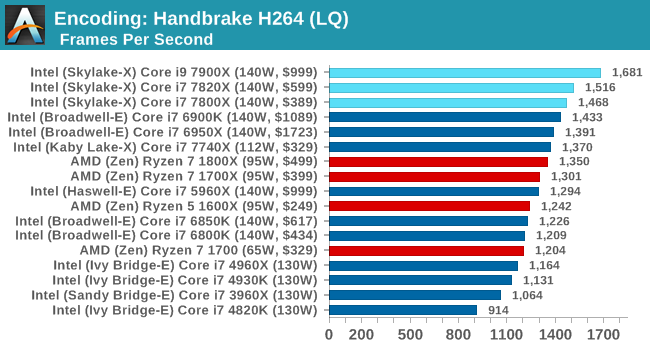
More cores, more frequency, more IPC, more fun: the Core i9-7900X wins here, and even the i7-7800X wins out against the Core i7-6900K.
High Quality/Resolution H264: A similar test, but this time we take a ten-minute double 4K (3840x4320) file running at 60 Hz and transcode from Main to High, using the very-fast preset.
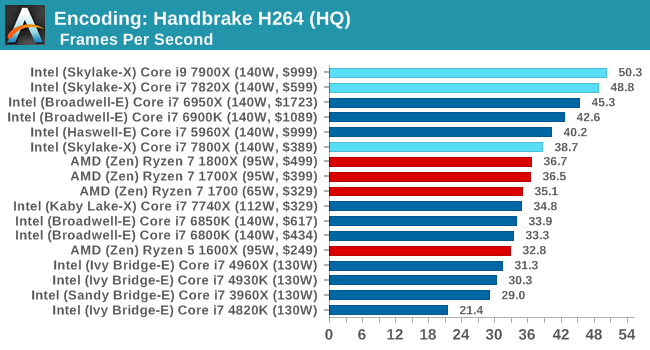
Moving into HQ mode means making the job more parallel, so the higher core counts stay at the top of the chart.
HEVC Test: Using the same video in HQ, we change the resolution and codec of the original video from 4K60 in H264 into 4K60 HEVC.
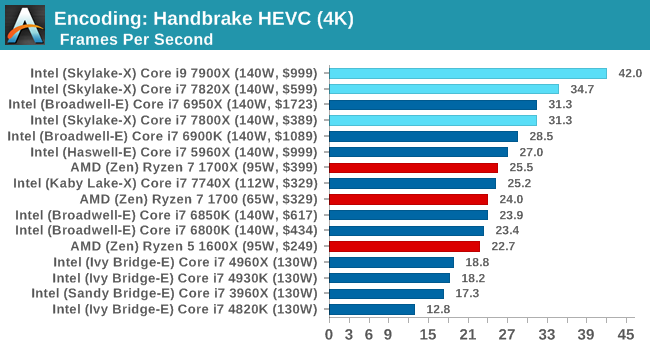
WinRAR 5.40
For the 2017 test suite, we move to the latest version of WinRAR in our compression test. WinRAR in some quarters is more user friendly that 7-Zip, hence its inclusion. Rather than use a benchmark mode as we did with 7-Zip, here we take a set of files representative of a generic stack (33 video files in 1.37 GB, 2834 smaller website files in 370 folders in 150 MB) of compressible and incompressible formats. The results shown are the time taken to encode the file. Due to DRAM caching, we run the test 10 times and take the average of the last five runs when the benchmark is in a steady state.
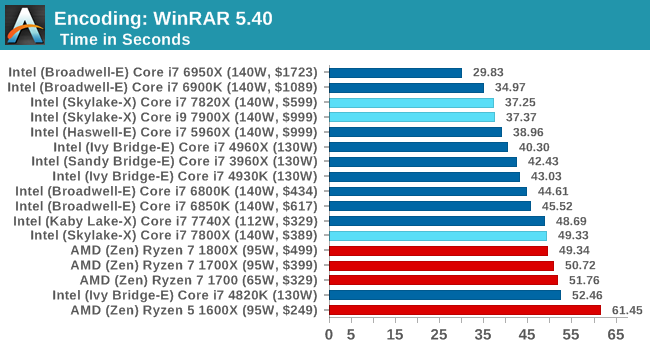
WinRAR loves having access to all the caches as much as possible, to prefetch and store data as needed. The Skylake-X chips fall back a bit here, even with DDR4-2666 support. The Core i7-7800X uses DDR4-2400 memory, so puts it further behind. Interesting didn't realise that the lower core count Broadwell-E chips were affected so much by this test, and the higher core count Ivy Bridge-E parts are faster here.
AES Encoding
Algorithms using AES coding have spread far and wide as a ubiquitous tool for encryption. Again, this is another CPU limited test, and modern CPUs have special AES pathways to accelerate their performance. We often see scaling in both frequency and cores with this benchmark. We use the latest version of TrueCrypt and run its benchmark mode over 1GB of in-DRAM data. Results shown are the GB/s average of encryption and decryption.
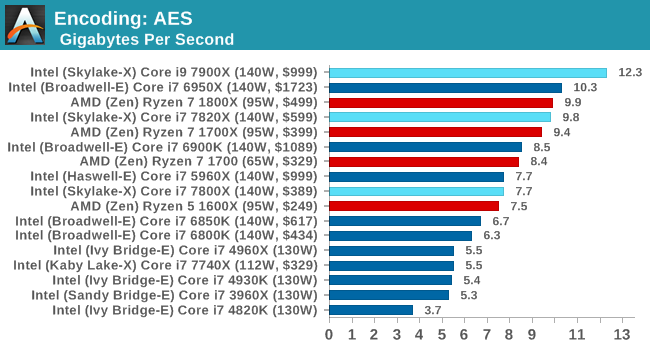
7-Zip
One of the freeware compression tools that offers good scaling performance between processors is 7-Zip. It runs under an open-source licence, is fast, and easy to use tool for power users. We run the benchmark mode via the command line for four loops and take the output score.
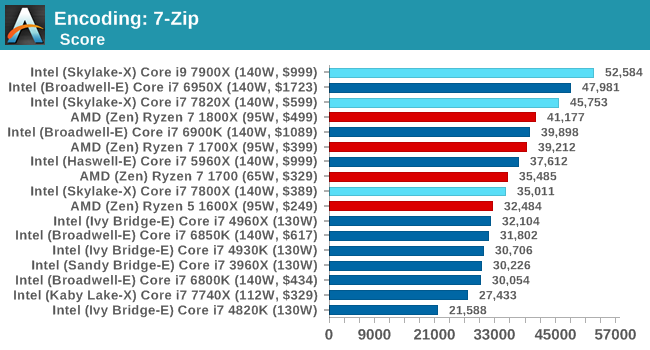










264 Comments
View All Comments
Tuna-Fish - Tuesday, June 20, 2017 - link
Just a tiny nitpick about the cache hierarchy table:TLBs are grouped with cache levels, that is, L1TLBs are with the L1 caches and the L2 TLB is with the L2 cache, as if the level of TLB is associated with the level of cache. This is not how they work -- any request only has to have it's address translated once, when it's loaded from the L1 cache. If there is a miss when accessing the L1 TLB, the L2 TLB is accessed before the L1 cache is.
PeterCordes - Monday, July 3, 2017 - link
This common mistake bugs me too! The transistors for the TLB's 2nd level are probably not even near the L2 cache. (And the L2 cache is physically indexed / physically tagged, so it doesn't care about translations or virtual addresses at all). The multi-level TLB is a separate hierarchy from the normal caches.I also commented earlier to point out several other errors in [the uarch details](http://www.anandtech.com/comments/11550/the-intel-... e.g. mixing up the register-file sizes with the scheduler size.
yeeeeman - Tuesday, June 20, 2017 - link
What this review shows just how good of a deal AMD Ryzen CPUs are. I mean, R7 1700 is like 300$ and it keeps up in many of the tests with the big boys from Intel.Carmen00 - Tuesday, June 20, 2017 - link
Small typo on the first page, Ian: "For $60 less than the price of the Core i7-7800X...". But the comparison shows $389 vs $299, which is a $90 difference. Otherwise a fantastic, in-depth review, thank you very much!Ian Cutress - Tuesday, June 20, 2017 - link
Official MSRPs haven't changed. What distributors do with their stock is a different story.Carmen00 - Wednesday, June 21, 2017 - link
I'm talking about the MSRPs. There's a table ("Comparison: Core i7-7800X vs. Ryzen 7 1700") on Page 1 with the MSRPs as $299 and $389, a $90 difference. The text just above this table says that there's a $60 difference, but 389-299=90, not 60. So either the text is incorrect, or the MSRPs in the table are incorrect.Tephereth - Tuesday, June 20, 2017 - link
Missing temps and in-game benchmarks... u're the only one in the whole web that has an 7800x to test, so please post those :(Gothmoth - Tuesday, June 20, 2017 - link
after reading a dozend reviews i say:great now we have the choice between two buggy platforms.... well done.
i am not going to be a bios betatester for AMD or Intel.
these two release are the worst in many years i would say.
i hope AMD has threadripper ironed out.
AntDX316 - Tuesday, June 20, 2017 - link
The new processors are in totally another level/league/class. It dominates in everything and more except a couple benches.AnandTechReader2017 - Tuesday, June 20, 2017 - link
Of course they are, Ryzen is mainstream, Thread Ripper is the competitor.Thread Ripper will be quite interesting, the scaling of the "infinity fabric" will come to the fore and show if AMD's new architecture is a worthy competitor.